Online Restaurant Reservation Systems have seen continued growth and changes in 2017, with new entrants and some getting a lot quieter. We do a comparison of some of the big online Restaurant Reservation systems and go through the pros and cons of all of them. In our opinion some are significantly better than others. When it comes to Quandoo vs Dimmi vs Tock vs OpenTable vs Obee vs our own Free Online Restaurant Booking system, which one is best for you?
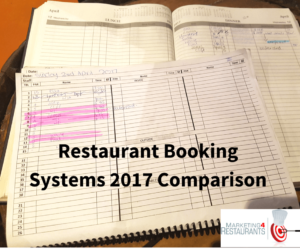
Our Restaurant Reservation System Comparison looks at a range of Online Bookings systems for Restaurants and provides guidance on which is right for your restaurant.
The market for online bookings widgets for Restaurants falls into two categories, the aggregators and the non aggregators. The aggregators generally work for the consumer, offering a range of Restaurants, often with some offering discounts. There may be incentives for diners to book with them. These are the Business to Consumer Models, they aren’t concerned where a restaurant booking is made, they make money if any of a range of Restaurants get a booking. The non-aggregators are Business to Business and work with the Restaurant. They are successful when an individual restaurant makes a booking.
We have compared a range of Restaurant Reservation Systems to give you the information you need to make the right choice for your Restaurant.
Dimmi
Australia’s first restaurant booking company was founded in 2009 and was acquired by Tripadvisor in 2015. It charges between $1 and $3 per seat as well as a monthly charge. It currently claims to have 4,000 Restaurants using it’s system. Under Tripadvisor some Restaurants have questioned the link between issues with Reviews and the Booking system. Tripadvisor fake reviews have had a long history of negatively impacting hotels and restaurants. Dimmi has tried to make progress in decreasing no shows in the industry, but it appears that their data may not be accurate. Some wiley Restaurant owners, in an effort to decrease the cost of online bookings through the Dimmi system, have marked bookings as no shows, when in fact the guests actually arrived at the Restaurant. It is unclear how widespread the issue is, but we are aware of more than a few Restaurants who do this.
Quandoo
Founded in 2012 in Germany, Quandoo started out by copying the OpenTable model. It was purchased by Recruit Com, a Japanese company originally in HR, in 2015 for $219 million. It claims to have 17,000 Restaurants worldwide. It charges per seat for bookings. It started by copying the OpenTable model so it was using 2012 technology to solve a 1998 problem. This allowed for a much slicker interface and a much cheaper software development cost, as well as relying on all of the market research that OpenTable about what worked and what didn’t which had already done. In Australia Quandoo has been quite aggressive, and it appears to be snapping at the heels of Dimmi. It is quite strong in Europe. Quandoo can send a lot of Restaurant when your customers make a booking through their system.
OpenTable
Founded in 1998 in San Francisco, it was purchased in 2014 by The Priceline Group for $2.6 billion. It has a very strong base in the United States, with a lot of Restaurants happy with it. It is often criticised for having a clunky system which is difficult for Restaurants to use. It includes a table management system to help restaurants manage the turns of their tables. It Australia, it purchased Respak and is making use of their system. Respak was predominantly focused on the 5 star hotel restaurant part of the market. Although OpenTable entered Australia a while ago, it has been off to a slow start, struggling to find a niche between the incumbent Dimmi and the quick moving Quandoo and struggling to make a value proposition given it’s higher fees.
Tock – Tock is a Premium booking system that takes payment up front, which is one of the most effective ways of decreasing no shows. This is particularly important in fine dining, because of the food and time spent in prepping for customers. No shows can also be very expensive, especially in fine dining, where it may be difficult to get a last minute replacement for a booking that is a no show. Tock builds the database on behalf of the Restaurant and never emails those customers on behalf of other restaurants. This is important for any Restaurant, but absolutely critical for fine dining because a customer list of people prepared to pay $100 or often significantly more would be highly valuable, so you don’t want to be sharing those email addresses with any company that will conduct marketing activities on behalf of other Restaurants. We suspect that Tock’s success is because of fine dining Restaurants wanting to, quite rightly, jealously protect the identity of their customers and the need for a solution that tackled the no show issue. Being able to run a Restaurant where there is so much anticipation of dining there that customers are prepared to prepay is a gold standard of success and it handles the issues of the economics around no shows brilliantly.
Obee – Obee is an Australian developed table management that also provides a booking system, and it doesn’t collect email address for it’s own use, which is great. It was founded in 2010 by Owen Parry and currently has 600 customers across Australia and New Zealand. It supports vouchers and events as well as wait list management.
Free Online Restaurant Booking System – The team at Marketing4Restaurants built our own Restaurant Reservation system to assist Restaurants to build their email databases, cut the costs of taking bookings online and to enable them to do so without having to share their customers
The problems with Online Booking Aggregators
The Aggregators, like Dimmi, OT and Quandoo, try to get between a Restaurant and their customer. The want the customer to use their app to make a booking so that they can charge a fee for it. They will often market against the Restaurants using their system in an effort to get the customer to book through their system and not the Restaurants.
Aggregation makes it very difficult for Restaurants to compete on anything else than their willingness to pay for promoted positions in the app, their ability to offer coupons to their customers and their prices. It is hard for the story of what makes you Restaurant unique to get through to the customer, which makes it hard to build in margin.
Restaurant Booking Arbitrage
An excellent article on Restaurant Booking Arbitrage was written by Brian Fitzpatrick, who is an ex Google employee and now works for Tock The article highlights one of the more insidious parts of some Restaurant booking systems. Restaurant Booking Arbitrage occurs when your booking company competes against you with Adwords trying to get the booking through their website and not yours. They will then charge a higher fee. Because they are running Google Adwords campaigns they naturally appear above the link of the Restaurant. The aggregator gets to funnel a customer to the Restaurant and maybe make a little money between the difference they pay for the adword and the money they make on the booking. Both Dimmi and OpenTable have been seen to do this. It creates a lot of confusion for the Restaurant because they think that the Dimmi is creating bokings for them, when in realty, all they are doing is clipping the ticket on the way through from a Restaurant’s customer who was going to make a booking.
Margin erosion causedRestaurant Booking Aggregators
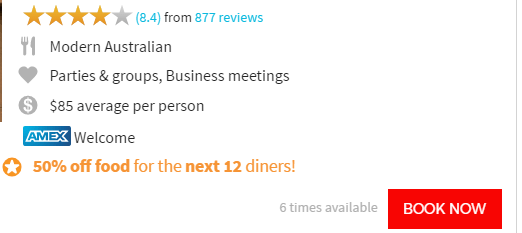
These kinds of Dimmi deals are similar to Groupon and could lead to margin erosion for all Restaurants.
Protecting your Restaurant’s Intellectual Property
It is critically important to ensure that you are searching for your Restaurant in the places that your customers are searching. We searched for one Restaurant, who is not using Dimmi and Google recommended the page that Dimmi had set up on Dimmi’s website for the Restaurant. That page did not allow bookings with Dimmi for that Restaurant, (because the Restaurant did not want to use Dimmi), but it did suggest 4 other Restaurants that are offering bookings in Dimmi. This is very misleading for the public, who may think that the Restaurant is not taking bookings and it creates a financial impact for the Restaurant as it loses bookings that Dimmi have potentially baited and switched to another Restaurant.
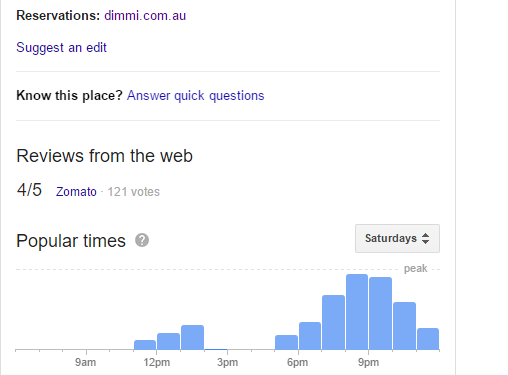
Maintaining control of your intellectual property is important. This is the search result for a Restaurant that is not even with Dimmi. It leads to a page offering other Restaurants.
There are issues with OpenTable as well, with very few of the emails from people making bookings on a Restaurants website actually being given to the Restaurant. This causes great concern with many Restaurants and it makes it incredibly difficult to build up a business of repeat customers when you don’t have the customers email address.
The optin for customers to allow the Restaurant to see their email address.
Has Zomato left Australia?
Zomato has gone very quiet over the last 6 months, but it doesn’t appear that they have left Australia just yet. The domain www.zomato.com.au returns an error and their marketing has decreased dramatically as well as we aren’t seeing anywhere as many Restaurants using Zomato. They may have changed tack and moved back to a more Urban Spoon model and selling marketing campaigns. We haven’t spoken to any Restaurants using Zomato in the last six months, but in the past the campaigns tended to be very expensive and produced little to no results. The booking process looks like it is manually processed, which would be time consuming and expensive.
Are aggregators like Dimmi and OpenTable responsible for the decrease in Restaurant customer loyalty?
One big trend that we have seen a lot of Restaurants complain about over the last 5 years is decreasing loyalty in their Restaurant customers. We believe that customers are less likely to come back because they are receiving offers and information from the aggregators about other Restaurants. It is bad enough when they receive information about a new Restaurant, but it is unsustainable when they receive a 50% of discount to another Restaurant. These restaurants are generally struggling (why else would you offer a 50% off coupon) and are relying on the aggregator to drum up some business for them. They probably don’t have their own email marketing database so they rely on the database of the aggregator. The insidious part is that the aggregator is sending your customers these offers. We have had customers in tears when they link starting to use something like Dimmi or Quandoo and release that their regulars have stopped returning. Who can blame them, who wouldn’t look to try a Restaurant that is offering 50% of their bill, but it makes it unsustainable for the Restaurant.
One trick we recommend to all Restaurants using an online booking system is to sign up for a new gmail account and then to make a booking using that system. This way you can see exactly the kind of offers that customers are being sent by the aggregator.
Which Restaurant Reservation System for your Restaurant?
That really depends on your business and marketing strategy. Restaurant Booking aggregators works well for:
- Restaurants who are able to run large discount offers;
- Restaurants focusing on the low cost part of the market;
- Restaurants without any marketing skills; and
- Restaurants who don’t have a particularly strong story to tell.
The downside of the aggregators, especially the sharing of customer email addresses or in the case of OpenTable not even receiving the email addresses unless they opt in, is that it makes database marketing very difficult. If a customer receives a 50% off coupon to another Restaurant, it can increase the customers price sensitivity. We think this Groupon by Stealth marketing is perilous for the industry.
If you are a fine dining establishment with customers willing to prepay, then Tock is definitely your choice of booking system, we think.
Have a look at Obee, if you need table management. It is a slick product with a lot of happy customers.
For everyone else, take a look at the Free Online Restaurant Booking system. We’ve taken tens of millions of dollars worth of bookings, have customers in the United States, United Kingdom, Australia and an ever growing number of countries around the world.
We personally think that the Aggregator model has had it’s day. Really they are just the 2010 version of the Yellow Pages and clipping the ticket on the way through, whilst building their own email customer database is not the best thing for Restaurants, particularly when Restaurants are working harder than ever to try and tell their story in a meaningful app. Being in a list of Restaurants doesn’t give customers any chance of really understanding what it is that is exciting and unique about the Restaurant. We see and are helping more and more Restaurants to move away from these channels and to tell an exciting story to customers who appreciate the hard work front of house and back of house and are therefore much more likely to become repeat customers, particularly when the Restaurant has the email details of the customer.
That’s our comparison of Restaurant Reservation Systems. If you have any questions, ping us an email or hit us up on Facebook.
May you Restaurant’s customer database be big and juicy!
If you take bookings for your Restaurant, you should ditch the old fashioned book and start taking bookings from your own website. This is one of the quickest ways to build a restaurant marketing database. Taking Restaurant bookings online allows you to take bookings 24 hours a day, cuts down on errors, saves staff time and best of all, it builds your Restaurant Marketing Database. Don’t use an online Restaurant Booking system that charges you to take bookings from your own customers, and never share you customer details with other customers. With our Free Online Restaurant Booking System, taking restaurant bookings online has never been easier, and like FROLO, best of all it’s free.
Our FORBS has taken over $15,000,000 worth of bookings for Restaurants.
Is Poor SEO Killing Your Restaurant?
Too many times we see customers with websites that are costing restaurants thousands of dollars every month through poor design, poor messaging and poor SEO. If your website could be improved to bring in 200 extra visits per month and just 10% of those made a booking, and each booking was for 2.5 seats on average at $50 a seat, you would have an extra $2,500 in revenue a month. A 30% food cost, that is $1,750 in profit extra a month. This ignores those customers coming back as regulars – which is more profit.
Remember, if these customers aren’t finding your Restaurant, they are finding your competitors.
Get one of our obligation free 7 point website SEO audits to see what you can get your web developer to fix to increase your revenue today.

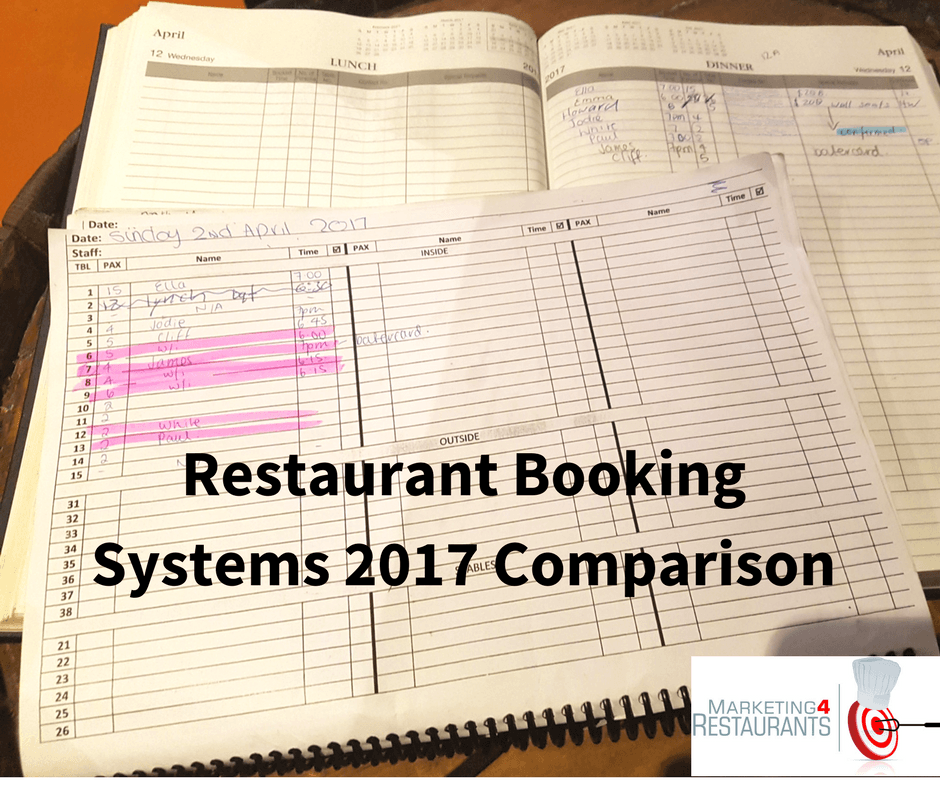
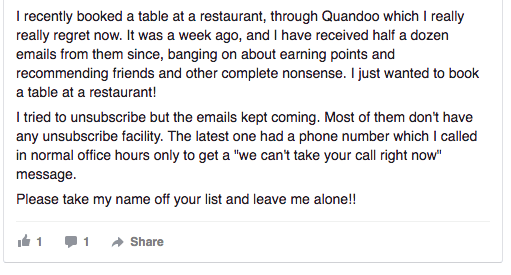
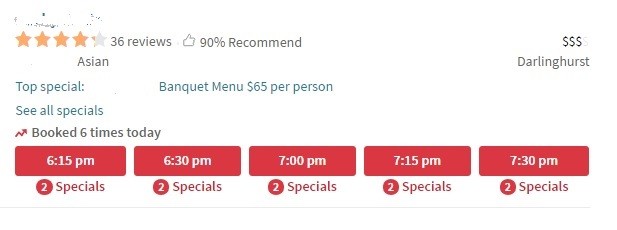
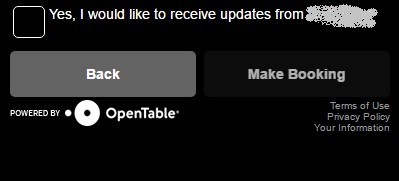


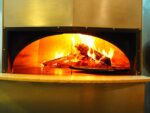
Great article: clearly explains the systems in use, and the risks and pitfalls for the restaurateurs. I would agree to keeping away from the aggregators all together unless you’re a low-cost/cheap-end kind of establishment with no desire or need for return customers (for example in tourist trap areas with low-quality food like Lygon St. in Melbourne). The Groupon phenomenon has destroyed that distribution channel with its fake offers of cheap and nasty rubbish – even the skinflints who think they’re getting some kind of ‘deal’ for crap they don’t need are awake to them, and the sector has eaten itself. I guess the aggregators are going the same way.